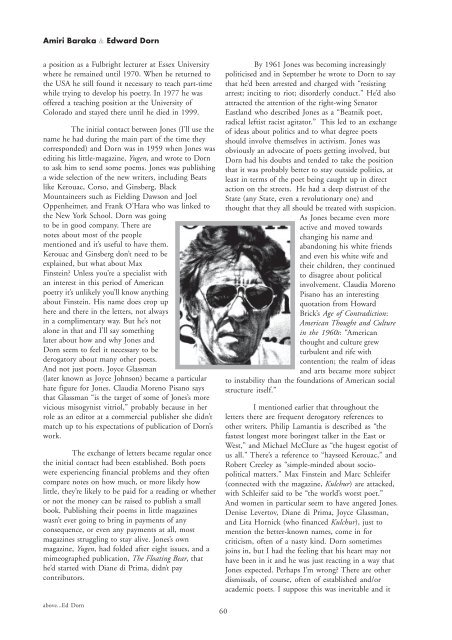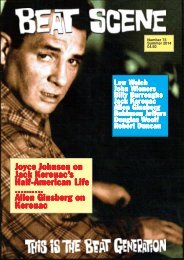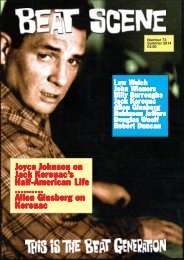Create successful ePaper yourself
Turn your PDF publications into a flip-book with our unique Google optimized e-Paper software.
Amiri Baraka & Edward Dorn<br />
a position as a Fulbright lecturer at Essex University<br />
where he remained until 1970. When he returned to<br />
the USA he still found it necessary to teach part-time<br />
while trying to develop his poetry. In 1977 he was<br />
offered a teaching position at the University of<br />
Colorado and stayed there until he died in 1999.<br />
The initial contact between Jones (I’ll use the<br />
name he had during the main part of the time they<br />
corresponded) and Dorn was in 1959 when Jones was<br />
editing his little-magazine, Yugen, and wrote to Dorn<br />
to ask him to send some poems. Jones was publishing<br />
a wide selection of the new writers, including Beats<br />
like Kerouac, Corso, and Ginsberg, Black<br />
Mountaineers such as Fielding Dawson and Joel<br />
Oppenheimer, and Frank O’Hara who was linked to<br />
the New York School. Dorn was going<br />
to be in good company. There are<br />
notes about most of the people<br />
mentioned and it’s useful to have them.<br />
Kerouac and Ginsberg don’t need to be<br />
explained, but what about Max<br />
Finstein? Unless you’re a specialist with<br />
an interest in this period of American<br />
poetry it’s unlikely you’ll know anything<br />
about Finstein. His name does crop up<br />
here and there in the letters, not always<br />
in a complimentary way. But he’s not<br />
alone in that and I’ll say something<br />
later about how and why Jones and<br />
Dorn seem to feel it necessary to be<br />
derogatory about many other poets.<br />
And not just poets. Joyce Glassman<br />
(later known as Joyce Johnson) became a particular<br />
hate figure for Jones. Claudia Moreno Pisano says<br />
that Glassman “is the target of some of Jones’s more<br />
vicious misogynist vitriol,” probably because in her<br />
role as an editor at a commercial publisher she didn’t<br />
match up to his expectations of publication of Dorn’s<br />
work.<br />
The exchange of letters became regular once<br />
the initial contact had been established. Both poets<br />
were experiencing financial problems and they often<br />
compare notes on how much, or more likely how<br />
little, they’re likely to be paid for a reading or whether<br />
or not the money can be raised to publish a small<br />
book. Publishing their poems in little magazines<br />
wasn’t ever going to bring in payments of any<br />
consequence, or even any payments at all, most<br />
magazines struggling to stay alive. Jones’s own<br />
magazine, Yugen, had folded after eight issues, and a<br />
mimeographed publication, The Floating Bear, that<br />
he’d started with Diane di Prima, didn’t pay<br />
contributors.<br />
above...Ed Dorn<br />
60<br />
By 1961 Jones was becoming increasingly<br />
politicised and in September he wrote to Dorn to say<br />
that he’d been arrested and charged with “resisting<br />
arrest; inciting to riot; disorderly conduct.” He’d also<br />
attracted the attention of the right-wing Senator<br />
Eastland who described Jones as a “Beatnik poet,<br />
radical leftist racist agitator.” This led to an exchange<br />
of ideas about politics and to what degree poets<br />
should involve themselves in activism. Jones was<br />
obviously an advocate of poets getting involved, but<br />
Dorn had his doubts and tended to take the position<br />
that it was probably better to stay outside politics, at<br />
least in terms of the poet being caught up in direct<br />
action on the streets. He had a deep distrust of the<br />
State (any State, even a revolutionary one) and<br />
thought that they all should be treated with suspicion.<br />
As Jones became even more<br />
active and moved towards<br />
changing his name and<br />
abandoning his white friends<br />
and even his white wife and<br />
their children, they continued<br />
to disagree about political<br />
involvement. Claudia Moreno<br />
Pisano has an interesting<br />
quotation from Howard<br />
Brick’s Age of Contradiction:<br />
American Thought and Culture<br />
in the 1960s: “American<br />
thought and culture grew<br />
turbulent and rife with<br />
contention; the realm of ideas<br />
and arts became more subject<br />
to instability than the foundations of American social<br />
structure itself.”<br />
I mentioned earlier that throughout the<br />
letters there are frequent derogatory references to<br />
other writers. Philip Lamantia is described as “the<br />
fastest longest more boringest talker in the East or<br />
West,” and Michael McClure as “the hugest egotist of<br />
us all.” There’s a reference to “hayseed Kerouac,” and<br />
Robert Creeley as “simple-minded about sociopolitical<br />
matters.” Max Finstein and Marc Schleifer<br />
(connected with the magazine, Kulchur) are attacked,<br />
with Schleifer said to be “the world’s worst poet.”<br />
And women in particular seem to have angered Jones.<br />
Denise Levertov, Diane di Prima, Joyce Glassman,<br />
and Lita Hornick (who financed Kulchur), just to<br />
mention the better-known names, come in for<br />
criticism, often of a nasty kind. Dorn sometimes<br />
joins in, but I had the feeling that his heart may not<br />
have been in it and he was just reacting in a way that<br />
Jones expected. Perhaps I’m wrong? There are other<br />
dismissals, of course, often of established and/or<br />
academic poets. I suppose this was inevitable and it





